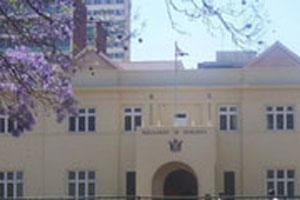
THE curtains are about to drop on the 7th Parliament of Zimbabwe, but analysts have mixed feelings over its performance during the past five years. Its life ends on June 29, unless President Robert Mugabe prematurely dissolves it.
REPORT BY PATRICE MAKOVA
While some said they were largely dissatisfied with its performance, others are of the opinion that it tried its best under the difficult circumstances. Parliament plays an oversight role on the executive arm of the State among other things such as, passing laws, ensuring transparency and accountability, monitoring the implementation of government programmes and projects and debating matters of topical interest.
For the first time, the two MDC formations had a combined majority in the House of Assembly, but Zanu PF dominated the Senate.
University of Zimbabwe political science lecturer, Eldred Masunungure said the performance of the 7th Parliament was generally unsatisfactory.
He said it failed to take full advantage of the opportunities presented by a political transition to make radical changes to the political landscape.
“My assessment is that it was an opportunity lost. The environment presented an opportunity to break Parliament’s relation with the Executive, but this did not happen. As a result the Executive is still domineering,” said Masunungure.
He said although Parliamentary Portfolio Committees were robust and exposed excesses by the Executive, overall, Parliament as a collective institution could have done better.
- Chamisa under fire over US$120K donation
- Mavhunga puts DeMbare into Chibuku quarterfinals
- Pension funds bet on Cabora Bassa oilfields
- Councils defy govt fire tender directive
Keep Reading
National Constitutional Assembly (NCA) director of information, Blessing Vava said the calibre of some MPs left a lot to be desired, as some of them never uttered a word apart from the swearing in session.
“They were just rubber stampers and backbenchers, probably not knowing what exactly their role was,” he said. Vava said the whipping system by political parties also made MPs ineffective, thereby inhibiting debate.
He said Parliament was reduced to a rubber stamping authority of decisions made by Global Political Agreement (GPA) principals namely Mugabe of Zanu PF, Prime Minister Morgan Tsvangirai of MDC-T and Professor Welshman Ncube of the smaller MDC formation.
But political scientist, Shakespeare Hamauswa said the 7th Parliament did its best, especially in view of the political stand-off that largely characterised its term of office.
He said portfolio committees did a good job and managed to come up with well-researched reports and recommendations.
Hamauswa said the challenge was that the environment was highly polarised and the Executive and some employees of the parliament interfered with the business of Parliament.
He said one of its major achievements include the new constitution, realignment of other statutory bodies like the Reserve Bank of Zimbabwe (RBZ), and the setting up of commissions such as, the Zimbabwe Electoral Commission and the Anti-Corruption Commission.
“It was not an issue of rubber stamping policies and programmes, like what if used to be in the past. Private members’ Bills were introduced in the 7th parliament unlike what has been happening in the past,” said Hamauswa.
Mbizo MP, Settlement Chikwinya brought before the House a motion on unconstitutional statements by the country’s service chiefs while Mutare Central legislator, Innocent Gonese brought a private member’s Bill to amend the Public Order and Security Act (Posa) deemed suppressive of freedom of expression.
Other bills included the Public Finance Management Act, meant to improve accountability in the public resources, the RBZ Amendment Act, as well as the National Security Council Act which led to the disbandment of the Joint Operations Command (JOC).
JOC comprised security chiefs that supported Mugabe and allegedly violated human rights.
Hamauswa said the debates in Parliament were live and objective.
“However, in certain instances the Parliament was there to approve the decisions of the principals, like in the case of adopting the new Constitution. Some members were insulated from scrutiny, such as the minister of Mines and other ministries especially [those] led by Zanu PF,” said the political scientist.
Elections Resources Director (ERC), Tawanda Chimhini was of the opinion that the 7th Parliament was one of the most effective since 1980, as it managed to enact progressive laws, particularly those related to elections.
He said while Parliament sometimes rubber-stamped, the portfolio committees took government to task on various issues and was on the ground ensuring that voter registration was done properly.
“Their public hearings were the most effective and we have been reliably informed that this ruffled some feathers in government,” said Chimhini.
But he admitted that while Parliament played an oversight role, it was unfortunate that the Executive ignored its recommendations.
“The oversight role only works when you have a responsive government. We should have seen a lot of ministers and government officials resigning because of the works of these committees,” said the ERC official.
Other committees that were vocal included the budget and finance, public accounts, as well as home affairs and defence.
But some analysts insisted that Parliament has lost its credibility and integrity, saying the GNU has treated it with absolute contempt and disrespect.











